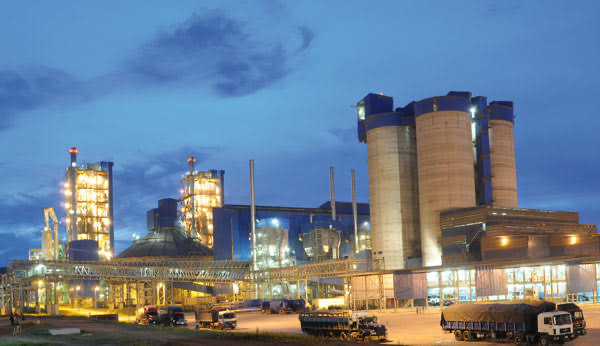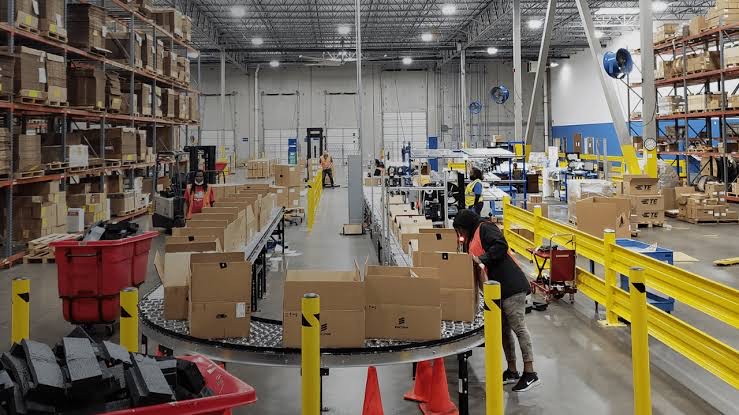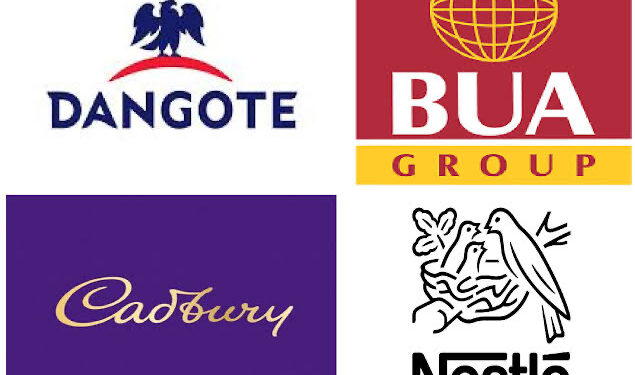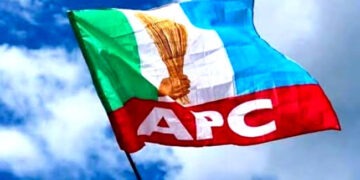Thirteen manufacturers listed on the Nigerian Exchange Limited saw a 97% increase in production costs in the first half of 2024.
The companies analyzed are Dangote Cement Plc, BUA Foods Plc, Nigerian Breweries Plc, Nestle Nigeria Plc, BUA Cement Plc, Lafarge Africa Plc, Dangote Sugar Refinery Plc, International Breweries Plc, Guinness Nigeria Plc, Unilever Nigeria Plc, Cadbury Nigeria Plc, Nascon Allied Industries Plc and Champion Breweries Plc.
According to the manufacturers’ latest financial reports, total distribution costs increased to 3.5 trillion naira in the first half of this year from 1.55 billion naira in the same period of 2023.
“The increase in manufacturers’ production cost is driven by inflation and volatility in exchange rate even though there has been a bit of stability but at the beginning of the year the exchange rate was uncertain,” said Uchenna Uzo, a marketing professor at Lagos Business School (LBS).
He explained that electricity prices have increased and manufacturers are feeling the effects. “The cost of distribution has also gone up which has increased the production cost of manufacturers and they are looking for how to address it,” he explained.

He said the ongoing impact of production costs means more manufacturers will go out of business, mergers will take place, employees will be laid off, and waste in the system will be reduced as cost efficiency increases.
Bolade Agboola, consumer goods analyst at Chapel Hill Denham, said the rising inflationary environment and currency issues are the main factors causing the rise in production costs for manufacturers.
“Inflation and exchange rate is the major factor affecting the manufacturers production cost,” she said. “Exchange rate is a factor because most manufacturers import raw materials they use.”
Agboola explained that “Most of the manufacturers are trying to reduce their exposure to FX which is by backward integration, changing business models to reduce their FX obligations,” adding that such strategies by manufacturers are positive and are trying to efficiently manage their operating costs. She explained that the outlook for manufacturing is bright given government measures to stabilize the exchange rate.
“The outlook for the manufacturing sector is still positive that they will be able to manage and scale through this challenging period.
“They will remain profitable going forward just that it will require them to be more strategic and make decisions that will continue to support the bottom line,” she said.
Data from the National Bureau of Statistics showed that Nigeria’s headline inflation rate fell to 33.40% in July, the lowest in almost two years, from 34.19% the previous month.
Individual Company Analysis;
BUA Foods’ production costs increased from NGN188.1 billion to NGN 453.9 billion.
Revenues increased from NGN 320.9 billion to NGN 672.4 billion.
Profit after tax increased from NGN 95.2 billion to NGN 130.9 billion.
Administrative costs increased from NGN 5.01 billion to NGN 10.1 billion and distribution costs increased from NGN 12.9 billion to NGN 18.4 billion.
BUA Foods is a Nigerian company based in Lagos. It is part of the Nigerian BUA conglomerate. The company’s business activities include the production, processing, and distribution of food products through its sugar, flour, pasta, rice, and edible oil businesses.
BUA Cement’s production costs increased from NGN 114.9 billion to NGN 254.7 billion.
Revenue increased from NGN 221.1 billion to NGN 363.9 billion.
Profit after tax was NGN 34.3 billion, down from NGN 63.6 billion.
Administrative expenses increased from NGN 6.13 billion to NGN 11.2 billion, while sales and distribution expenses increased from NGN 14.03 billion to NGN 16.3 billion.

BUA Cement is a publicly listed company headquartered in Nigeria that manufactures and sells cement products in the country. It is the second largest producer in Nigeria after Dangote Cement.
Dangote Cement’s production cost increased from 383.1 billion naira to 833.3 billion naira.
Revenue increased from 950.8 billion naira to 1.76 trillion naira.
Profit after tax increased from 178.6 billion naira to 189.9 billion naira.
Administrative expenses increased from 45.5 billion naira to 98.8 billion naira, while sales and distribution expenses increased from 153.2 billion naira to 304.5 billion naira.
Dangote Cement is a publicly listed multinational cement manufacturer headquartered in Lagos. The company is engaged in the manufacturing, processing, importing, packaging, and distribution of cement and related products in Nigeria and has factories or import terminals in nine other African countries.
International Breweries’ cost of production increased from 78.6 billion naira to 160.6 billion naira.
Revenue increased from 116.1 billion naira to 223.2 billion naira.
Loss after tax increased from 23.6 billion naira to 106.8 billion naira.
Administrative, marketing, and distribution expenses increased from 36.1 billion naira to 48.2 billion naira. International Breweries is a Nigerian brewery. It began production in December 1978 with an installed capacity of 200,000 hectoliters per year, which increased to 500,000 hectoliters per year in December 1982.
The cost of production for Nigerian Breweries increased from NGN 165.1 billion to NGN 320.1 billion.
Revenue increased from NGN 277.4 billion to NGN 479.8 billion.
Loss after tax increased from NGN 47.6 billion to NGN 85.2 billion. Administrative costs increased from 16.3 billion naira to 23.8 billion naira, while distribution costs increased from 68.5 billion naira to 97.1 billion naira. Nigerian Breweries is the largest brewery in Nigeria. It supplies the Nigerian market and West Africa.
Dangote Sugar Refinery’s Revenue increased from 202.8 billion naira to 295.6 billion naira.
Loss after tax increased from 27.9 billion naira to 144 billion naira. Administration costs increased from NGN 5.83 billion to NGN 7.75 billion, while distribution costs increased from NGN 303.6 billion to NGN 310.3 billion.
Dangote Sugar Refinery is well known in the sugar refining sector of the Nigerian food and beverage industry. Our entry into the sugar business dates back to the 1970s when our parent company, Dangote Industries Limited, was importing and selling sugar.
Nestlé Nigeria’s production costs increased from NGN 154.4 billion to NGN 279.7 billion.
Revenue increased from NGN 261.8 billion to NGN 406.9 billion. Loss after tax increased from 49.9 billion naira to 176.9 billion naira.
Administrative costs increased from 6.19 billion naira to 13.3 billion naira, while marketing and distribution costs increased from 40.3 billion naira to 50.9 billion naira.
Nestlé Nigeria is a publicly listed specialty food and beverage company headquartered in Lagos. The company is majority-owned by a Switzerland-based holding company and has links to the Tolaram group of companies.
Champion Brewery’s production costs increased from 3.46 billion naira to 5.76 billion naira. Revenues increased from 5.71 billion naira to 9.54 billion naira.
Loss after tax was 386.7 billion naira, up from 29.07 billion naira.
Administrative costs increased from 824.9 billion naira to 1.23 billion naira, while distribution costs increased from 1.39 billion naira to 2 billion naira.
Champion Breweries is a Nigerian brewery based in Akwa Ibom State. The company produces Champion and Champ Malta Lager.
Cadbury Nigeria’s production costs increased from N25.38 billion to N41.85 billion. Revenue increased from N35.6 billion to N51.44 billion.
Loss after tax narrowed to N9.72 billion from N14.5 billion.
Administrative expenses increased from N803.9 million to N1.25 billion, while sales and distribution expenses increased from N3.36 billion to N3.39 billion.
Cadbury Nigeria is a food, confectionery, and beverage company headquartered in Lagos, Nigeria, and listed on the Nigerian Stock Exchange. Cadbury Nigeria Plc is a subsidiary of Mondelez International, one of the world’s largest snack companies.
Lafarge Africa’s production costs increased to 147.9 billion naira from 94.29 billion naira.
Revenue increased to 295.6 billion naira from 197.7 billion naira.
Profit after tax was 29.4 billion naira after a loss of 35.5 billion naira.
Administrative costs increased to 16.8 billion naira from 11.2 billion naira, while sales and distribution costs increased to 53.6 billion naira from 40.3 billion naira.
Lafarge Africa is a Lagos-based construction company listed on the Nigerian Stock Exchange. It is majority controlled by the Holcim Group. The company previously operated under the name Lafarge Wapco Plc. Following the merger of Lafarge and Holcim and the resulting consolidation of Lafarge’s assets in Nigeria and South Africa, the company changed its name to Lafarge Africa.
Nascon Allied Industries’ production costs increased from N36.5 billion to N28.4 billion.
Revenues increased from N38.2 billion to N50.4 billion.
Profit after tax was N4.84 billion after a loss of N5.82 billion.
Administrative costs increased from N2.02 billion to N3.12 billion, while distribution costs increased from N8.25 billion to N9.85 billion.
Nascon Allied Industries is a Nigeria-based company that refines and processes raw salt into edible grades of salt.
Unilever Nigeria’s production costs increased from N32.3 billion to N37.7 billion.
Revenue increased from 13.1 billion naira to 63.9 billion naira. Profit after tax was N4.44 billion, up N2.76 billion.
Marketing and administrative expenses increased from N6.5 billion to N16.9 billion.
Unilever Nigeria is a publicly listed company that trades and manufactures in the consumer goods market. In 2014, it was named among the 20 most valuable companies on the Nigerian Stock Exchange.

































